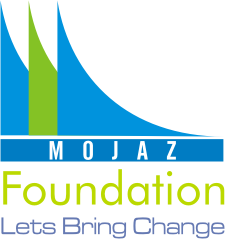Education
| Education
The existing situation of education service delivery in Pakistan is suffering from a host of problems. Literacy rates are falling, with just 58% literacy against a target of 88%, and a huge gulf between men (70%) and women (47%). School drop-out rates increase sharply around the transition to secondary school. Although the government is introducing various interventions to improve the access and quality of education. However, there is much to be desired. MOJAZ contributes to the government commitments by organizing and strengthening communities at grassroots level and building their capacity to take due interest and play an effective role in the enrollment and management of education.
Mojaz believes that a good quality, publicly-funded education should be available to all children. We work in districts with low literacy rates to help girls and boys get the education they need. By empowering local communities and supporting organizations at community level, we are working to remove barriers to education and help all children enroll in public schools through engaging volunteers and community members.
Our various projects on education have brought together community leaders, teachers, parents and children, to press for higher standards in schools besides ensuring that all school aged children have access to quality education. This has led to the strengthening of School Management Committees and also to the production of school improvement plans that are both understood and widely supported in the community.
MF’s main focus is to:
- Promoting right to education
- Promoting quality of education
- Promoting access to education
- Strengthening Communities to engage with the Government for improved service delivery through Social audit
Objective: increase access (by 30%) and retention (by 60%) in targeted communities through institutionalizing key driving factors and actors by engaging stakeholders by promoting education rights in target communities to break barriers to education (specially girls’ education)
Contributes to SD Goal 4, Target 4.1 “By 2030, ensure that all girls and boys complete free, equitable and quality primary and secondary education leading to relevant and effective learning outcomes”
And
Target 4.a: “Build and upgrade education facilities that are child, disability and gender sensitive and provide safe, non-violent, inclusive and effective learning environments for all.”
| Key Highlights




| Projects Under Education
Title | Ilmpossible: Take a Child to School (TACS) |
Objective | specific objectives of the current partnership with British Council are:
|
Duration | 2018 till 2021 |
Target Group/Beneficiaries | Out of School Children (OOSC) Enrolment (age 5 to 10) |
Supported by | British Council |
Geographic Focus | Pakistan/Punjab/ District Bahawalnagar/Tehsil Chistian/ 10 UCs |
Description: Mojaz Foundation has worked on ILM POSSIBLE: Take a child to school project phase-I (2015 to 2017) and Phase-II (2018 to 2021) in partnership with British Council in Bahawalnagar. The overall purpose of the program is enrollment and retention of primary school children in schools. Mojaz Foundation achieved its target of enrolling 5000 Out of School Children in Phase-I and 4303 in phase -II. Mojaz Foundation is involved in the scaling up of the program and retention and monitoring of the target numbers achieved during first & Second phase in partnership with British Council through the primary cycle up to transition into secondary schools. Expanding the area and scope of the program through enrolment of an additional number of out of school children (aged 6 to 11 years) in Bahawalnagar. The second phase activities started in 2018. With the support of volunteers, Mohalla committees, teachers and the administration, Mojaz Foundation successfully achieved all the project targets. In 2018 Mojaz Foundation enrolled 1866 Out of school children. The Mojaz team also successfully conducted 2 enrollment campaigns, 5 capacity building training of 165 Volunteers, MC Meetings, and District Education Events. In 2019, the enrollment Target was 1300 and Mojaz successfully enrolled 1408 out of school children. Mojaz Foundation also organized 3 capacity building training sessions for volunteers. Mojaz established 2 new Mohalla committees and Organized broad based community meetings and formation meetings for this purpose. In 2019 Mojaz Also organized a District community event and a Dosti Sports Event. Mojaz successfully conducted capacity building training for MC members. MCs conducted monthly meetings and completed 11 SAPs. Organized the 2 Enrollment Campaigns in the community. Mojaz Foundation established a District Task Force to highlight the issues of community and education at District level and to resolve them by using this platform with support of District Education Department, Administration and stakeholders. In 2020_2021 Enrollment target was 1000 TACS team enrolled 1094 OOSC 850 in cycle_I and 179 in cycle one 2021. During COVID-19 Pandemic TACS team, Volunteers and MCs play their key role to support and assist to poor people in the community through awareness campaigns, TACS team also organized corona relief activities in view COVID-19 pandemic situation through a volunteer’s team comprising of TACS volunteers and MC members, This Volunteers Force facilitate the poor people in community by conducting awareness sessions, distribution of rashan, registration of needy families in Ehsas Emergency Cash, Implementation of SOPs and Distribution of face masks and sanitizers. MCs conducted Monthly MC meetings by following SOPs and completed 11 SAPs in 2020-21. The TACS team also organized 2 capacity building workshops for Volunteers. A New Mohalla committee also established in 2020 and organized a broad base community meeting and formation meeting in UC 48/F. TACS team also distributed 100 educational kits under Har Ghar School Project by CGN-P during COVID Pandemic to engage our children with education safely at their homes. TACS team also organized a plantation campaign under the Clean and Green Pakistan initiative and planted more than 10000 plants in 2020-21 with collaboration and support of Volunteers, MCs and community stakeholders. Dosti Session in Dosti Schools als0 completed successfully. TACS Team also successfully achieved the retention target of 5000 students in TACS Phase-II 2018-21. | |
Achievements:
| |
Title | Ilmpossible: Take a Child to School (TACS) Project |
Objective |
|
Duration | 3 Year and 3 months Dec 2014 till May 2017 |
Target Group/Beneficiaries | Out of School Children (OOSC) Enrolment |
Supported by | British Council |
Geographic Focus | Pakistan/Punjab/District Bahawalnager/Tehsil Chistian/5 UCs |
Description: “ILMPOSSIBLE – Take a Child to School Mojaz Foundation successfully implemented the “ILMPOSSIBLE – Take a Child to School” project with financial support from Qatar-based Education Above All (EAA) Foundation through the British Council. The project introduced a specially designed sports and life skills component called DOSTI (Friendship), which was rolled out in 200 primary schools across Pakistan. DOSTI aimed to enhance coaching and sports facilities for young children while promoting holistic development through life skills. The partnership with the British Council had the following key objectives:
The project left a lasting impact by empowering communities, promoting education, and creating sustainable systems to support children’s learning journeys.
| |
Achievements:
| |
Title | Promoting Education: Every Child’s Right |
Objective |
|
Duration | 1 Year Jan 2014 till Dec 2014 |
Target Group/Beneficiaries | 6 villages Children missing out of school |
Supported by | Foundation Open Society Institute – Pakistan |
Geographic Focus | Pakistan/Punjab/ District Muzaffargarh/Tehsil Muzaffargarh, Jatoi and Alipur/ 6 villages(2 in each Tehsil) |
Description: The project aimed at promoting and protecting the right to education for children missing out of school by strengthening local communities at all levels, i.e. from the communities to tehsil to district. The goal was to ensure provision of quality education and promote the right to education to all children, particularly girls in Muzaffargarh district by carrying out enrolment campaigns and organizing interaction forums with the School Management Committees (SMCs). | |
Achievements:
| |
Title | Quality of Education Improvement Project |
Objective | The objective was to ensure provision of quality education and increase in access by implementing school education improvement plans that focused on an inclusive participatory, highly motivated SMC (consisting of teachers, parents and community members), introducing innovative monitoring of school management through client-tailored MIS, establishing financial sustainability, nurturing public-private partnerships and accountability (particularly with the local government), and extending official recognition to community for their role in making quality education accessible in the local setting. |
Duration | 2 Year Oct 2011 to Sep 2013 |
Target Group/Beneficiaries | 10 Public Schools, Communities(parents), Students |
Supported by | Foundation Open Society Institute – Pakistan |
Geographic Focus UC/District/Province | Pakistan/Punjab/ District Narowal/Tehsil Narowal/ |
Description: The Quality of Education Improvement project was implemented for two years in 10 schools of Narowal district of Punjab Province with the financial support of Open Society Foundation. The larger purpose of the project was to develop a scalable model for improvement in access and quality of education in 10 public schools. The project was first piloted in Narowal, Punjab in 10 public schools ensuring provision of quality and access to education by implementing school education improvement plans that focused on an inclusive participatory, highly motivated School Management Committees (SMC) (consisting of teachers, parents and community members), introducing innovative monitoring of school management through client-tailored MIS, establishing financial sustainability, nurturing public-private partnerships and accountability (particularly with the local government), and extending official recognition to community for their role in making quality education accessible in the local setting. | |
Achievements:
| |
